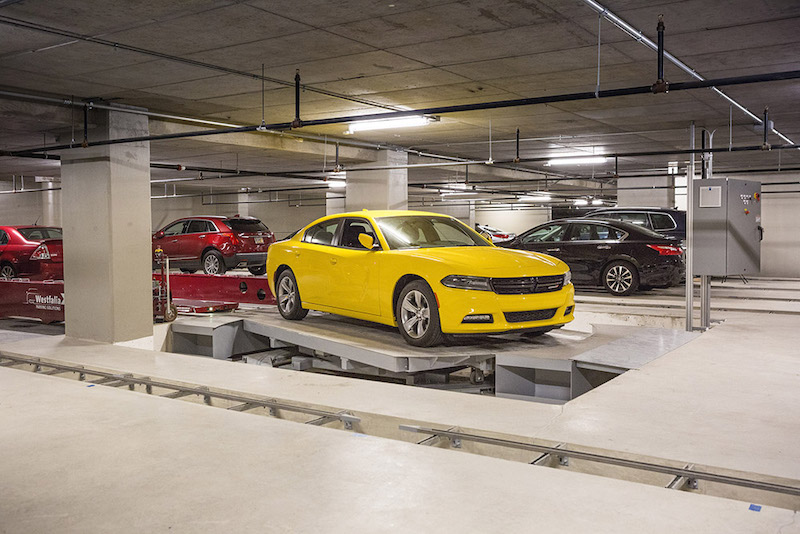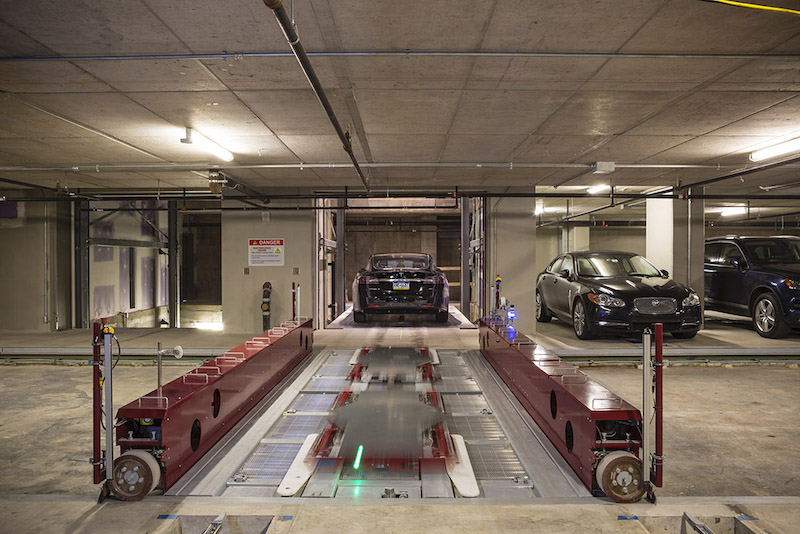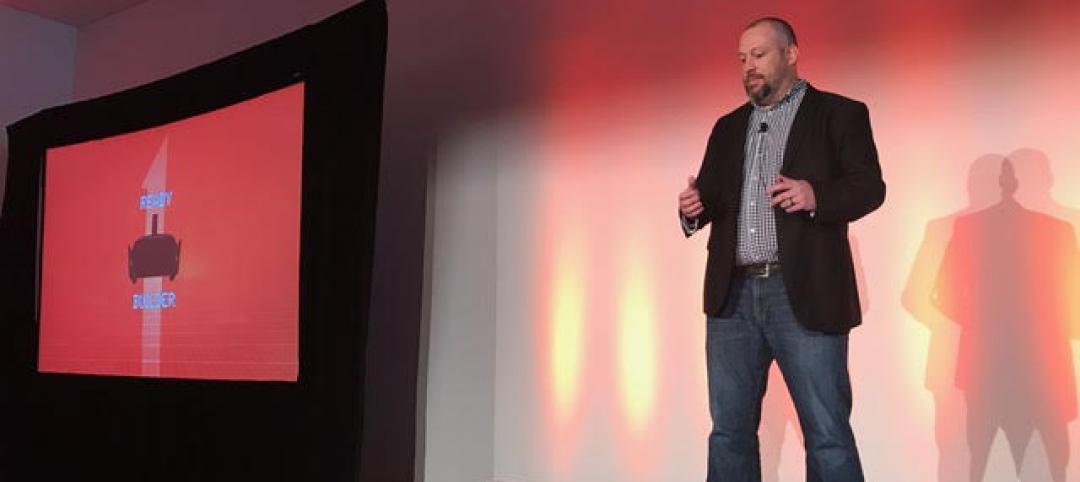500 Walnut is a 26-story luxury condo building with 35 residences whose selling prices average $5 million, the highest in Philadelphia to date, according to the building’s developer Scannapieco Development Corporation (SDC)
The tower—designed by Cecil Baker + Partners and built by Intech Construction—includes all of the high-end amenities one might expect, such as a heated pool, fitness center, dog grooming, massage room and sauna, and “outdoor retreat.” And then there’s something entirely different: an automated palletless parking system with 86 parking slots, far more than this building could have accommodated had it gone instead with a more conventional alternative.
“This amenity adds a level of convenience that no other building can,” says Tom Scannapieco, SDC’s owner.
How the automated parking system works
The system, installed by Westfalia Technologies of York, Pa., works like this: The resident drives into the building through a street-level bay door that he or she opens electronically via a transponder attached to the car’s grill or bumper. The driver enters a covered auto court—a kind of lobby, says Scannapieco—and then places the car into a transfer “cabin.” Drivers and passengers get out, and proceed to a kiosk into which the resident scans a key fob to answer a few safety questions on a touch screen—are the car doors shut, is the parking brake engaged, is the engine turned off, etc.—that the parking control system evaluates prior to storage.
A lift within the cabin lowers the car to the basement level, where the vehicle is then positioned onto a palletless transfer platform, which Westfalia’s Satellite (R) technology adjusts for the length of the car’s wheelbase. That platform rotates the vehicle 180 degrees so it can be easily driven out when retrieved, and then moves the car into the nearest parking slot.
When drivers need their vehicles, they can scan their fob either in the building’s elevator or at the kiosk, and the system automatically brings the car back to the transfer cabin. (The lobby kiosk notes the car’s position and expected retrieval time.)
500 Walnut has two transfer areas and two transfer platforms. Residents have 24/7 access to this system. There’s negligible risk of vehicle damage, theft, or break-in because there’s no reason for humans to be in the actual parking area.

The automated system rotates the car before it's parked, so that it can be easily driven out of the garage upon driver retrieval. Image: Courtesy of Westfalia Technologies
How much does all this cost? Scannapieco and Ian Todd, Westfalia’s director of Automated Parking Systems, didn’t answer that question directly. On a per-sf basis, 500 Walnut’s 50,840-sf garage with state-of-the-art technology and mechanicals cost double a conventional parking garage, Scannapieco estimates.
But he’s quick to note that on a per-car basis, “there’s no premium,” basing that assessment on the fact that a conventional parking ramp system, with fire protection and ventilation included, would have been impossible to pull off within a building this size, to say nothing of the number of parking slots that Westfalia’s solution provided.
“By having this technology, we’re doubling our parking yield,” says Scannapieco. Todd adds that the developer saved money on excavation, and increased the value of its residential units by enhancing the user’s experience. (Scannapieco says the parking garage has become the most popular amenity in the building.)
500 Walnut opened in early 2018. Westfalia is currently installing its second palletless parking system, with 160 parking slots, in another building about a mile from 500 Walnut. That building is scheduled to open next year. Westfalia also installs palleted systems, but Todd is convinced that the newer technology will catch on as more developers and prospective owners become aware of it.
He adds, parenthetically, that while an automated palletless parking system could be installed in an existing building, there are far greater efficiencies when that system is part of a building’s original design.
Related Stories
| Jun 13, 2017
Accelerate Live! talk: A case for Big Data in construction, Graham Cranston, Simpson Gumpertz & Heger
Graham Cranston shares SGH’s efforts to take hold of its project data using mathematical optimization techniques and information-rich interactive visual graphics.
| Jun 13, 2017
Accelerate Live! talk: Scaling change in a changing industry, Chris Mayer, Suffolk Construction
Suffolk’s CIO Chris Mayer talks about the firm’s framework for vetting and implementing new technologies and processes.
| Jun 13, 2017
Accelerate Live! talk: Gaming tech in construction, Lucas Richmond, Gilbane
Learn why Gilbane’s Lucas Richmond is looking outside the AEC industry to build his rockstar gaming and media team.
| Jun 12, 2017
Accelerate Live! talk: The world's smartest buildings, Derik Eckhardt, Miller Hull Partnership
Discover what architect Derik Eckhardt learned during his worldwide tour of the globe’s smartest buildings, from Abu Dhabi to Amsterdam to Stuttgart to Dubai.
| Jun 12, 2017
Accelerate Live! talk: Preparing for the AI revolution, Alan Robles, Gensler
Gensler’s Alan Robles shares how the AEC Giant firm is preparing its project teams and clients for the coming artificial intelligence movement.
| May 24, 2017
Accelerate Live! talk: Applying machine learning to building design, Daniel Davis, WeWork
Daniel Davis offers a glimpse into the world at WeWork, and how his team is rethinking workplace design with the help of machine learning tools.
| May 24, 2017
Accelerate Live! talk: Learning from Silicon Valley - Using SaaS to automate AEC, Sean Parham, Aditazz
Sean Parham shares how Aditazz is shaking up the traditional design and construction approaches by applying lessons from the tech world.
| May 24, 2017
Accelerate Live! talk: The data-driven future for AEC, Nathan Miller, Proving Ground
In this 15-minute talk at BD+C’s Accelerate Live! (May 11, 2017, Chicago), Nathan Miller presents his vision of a data-driven future for the business of design.
AEC Tech | May 23, 2017
A funny thing may happen on the way to AI
As AI proves safe, big business will want to reduce overhead.
AEC Tech | May 11, 2017
Accelerate Live!: Social media reactions from BD+C's AEC innovation conference
BD+C's inaugural Accelerate Live! innovation conference took place May 11, in Chicago.









